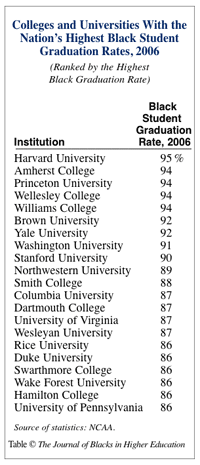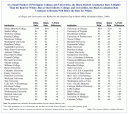Black Graduation Rates Reach Historic High
The Journal of Blacks in Higher Education (JBHE) reports that Black college graduation rates are currently the highest they have ever been, at 43%, an increase of 4 percentage points since 2003. Still, this rate remains a full 20 points behind the graduation rate for white students (63%).
The more closely we examine these numbers, the more curious they seem. For one thing, the graduation rate for Black women, at 47%, is a full 11 points higher than the graduation rate for Black men (36%).
An additional and equally surprising part of the story is exactly where Black students are having the most success (as measured by graduation rates). Recent anti-affirmative action rhetoric suggests that admitting African Americans and other people of African descent to selective colleges and universities does them a disservice, as it abandons them to fend for themselves in an academic environment in which the expectations for performance and skill far outstrip their capabilities.
Black graduation rates, however, tell a very different story. The following charts (from the current issue of JBHE) reveal that Black graduation rates are highest at the nation’s most selective institutions. In fact, at a handful of these institutions African American graduation rates are not only much higher than the Black national average of 43%; they are also higher than white graduation rates at the same schools. The chart immediately below lists the U.S. colleges and universities with the highest Black student graduation rates:

The chart below ranks selective U.S. colleges and Universities from the smallest disparity between Black and white graduation rates to the largest (beginning with those institutions at which the Black graduation rate is higher than the white graduation rate):

(Click on this thumbnail for a larger image)
JBHE explains the significance of these high graduation rates for Black students at selective institutions:
All told, there are 36 high-ranking colleges and universities that have a favorable black-white graduation rate difference of eight percentage points or less. Three years ago there were only 30. Five years ago only 16 high-ranking colleges and universities had a graduation rate gap of eight percentage points or less. This is a strong sign of progress.
Of these 36 institutions with the most favorable Black-white graduation rate difference, Oberlin College had the lowest graduation rate for Black students, at 78%. Curiously enough, this graduation rate was higher than the HBCU with the highest graduation rate (Spelman College, at 77%).Interestingly enough, the HBCU with the highest graduation rate, Spelman College, also happens to be the most selective.
The question that naturally arises from these numbers is: Which institutions are better equipped to serve African American undergraduates, Historically Black Colleges and Universities (HBCUs) or highly selective, majority white institutions?
I suspect that the answer to this question will be found in a discussion of the impact of class and resources (class size and the social and economic class of the students in question on the one hand; and the resources that an institution applies to financial aid and to the cultural, academic, and social support of its Black undergraduates).
In my experience, financial issues are the primary reason that students of color leave college. Financial challenges play a much greater role in student of color attrition than academic failure ever does…which brings me back to the relative success of selective institutions in retaining and graduating their Black students. It’s no secret that these institutions, in their efforts to attract the most academically able, also happen to attract the most financially able. And with their massive endowments, these colleges are among those institutions best prepared to provide a financial safety net that can enable students to stay focused on preparing for their futures, even when their family’s financial present is shaky.
Black-white test score comparisons aside, among U.S. students of African descent there is a strong correlation between class privilege and/or parents who are college-educated and stronger performance in the classroom and on exams like the SAT. This is a bias that is rarely discussed among both opponents and proponents of standardized admissions testings; and yet it goes a long way toward explaining the difference in retention rates between HBCUs and selective institutions.
HBCUs have built their collective legacy on the practice of believing in those students for whom traditional institutions would have no use, including those whose academic and personal profiles indicate more potential ability than actual demonstrated achivement. Often enough this leap of faith pays off; but with greater risk come greater rates of failure. Take a chance on more students whose aspiriations are their primary credentials and your institution will see a lower rate of graduation. But you will also see students completing their undergraduate degrees who would could never have achieved such success elsewhere.
Posted by Ajuan Mance
Posted in Academia, African American Students, Black Students, Current Events, Harvard University, Higher Education, Ivy League, My Favorite Blogs
February 20th, 2007 at 6:00 am
Excellent.
April 14th, 2007 at 2:40 pm
I see where the frustration comes from
April 14th, 2007 at 2:41 pm
Well, this means no one is actually monitoring performance and instituting approprate intervention
May 5th, 2007 at 3:32 pm
[…] of disciplines, and the dearth of Black doctorates in other fields deviates from the much more promising outlook for Black bachelor’s degree earners (whose increasing numbers and wide range of majors indicate significant progress). […]
March 5th, 2009 at 2:23 pm
While Harvard has a 95% rate of graduation for black students and Spelman might only have a 77% rate of graduation……….which one is actually graduating more STUDENTS, total. Hypothetically if Harvard only had 20 black students and Spelman had 200 wouldn’t Spelmans 77% be far more significant than Harvard’s 95%? Just curious. Being an HBCU graduate and a current graduate student at a PWI there is a higher percentage of black students graduating here but there are far less black students on the PWI campus in the first place.
March 9th, 2009 at 12:51 pm
Hi Courtney,
I think one of the answers to this is that, although it is a highly selective institution, Spelman does still admit a limited number of Black students on whom an institution like Harvard would never take a chance. While Harvard admits pretty much no students who could be classified as “at risk,” Spelman does admit a certain proportion of such students.
Indeed, this accounts for the significant differential between the graduation rates at the least selective HBCUs and the most selective HBCUs. Those less selective HBCUs “take a change” on students who places like Howard and Spelman would never admit.